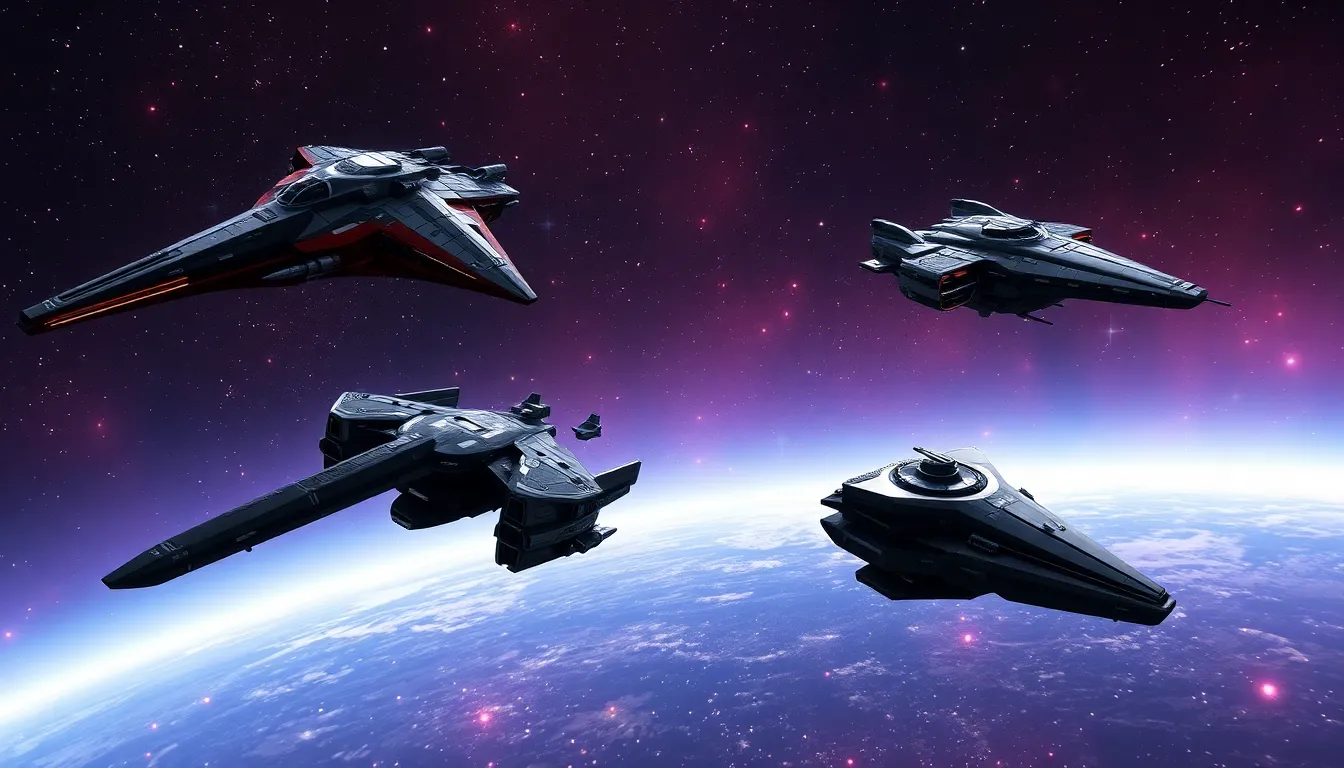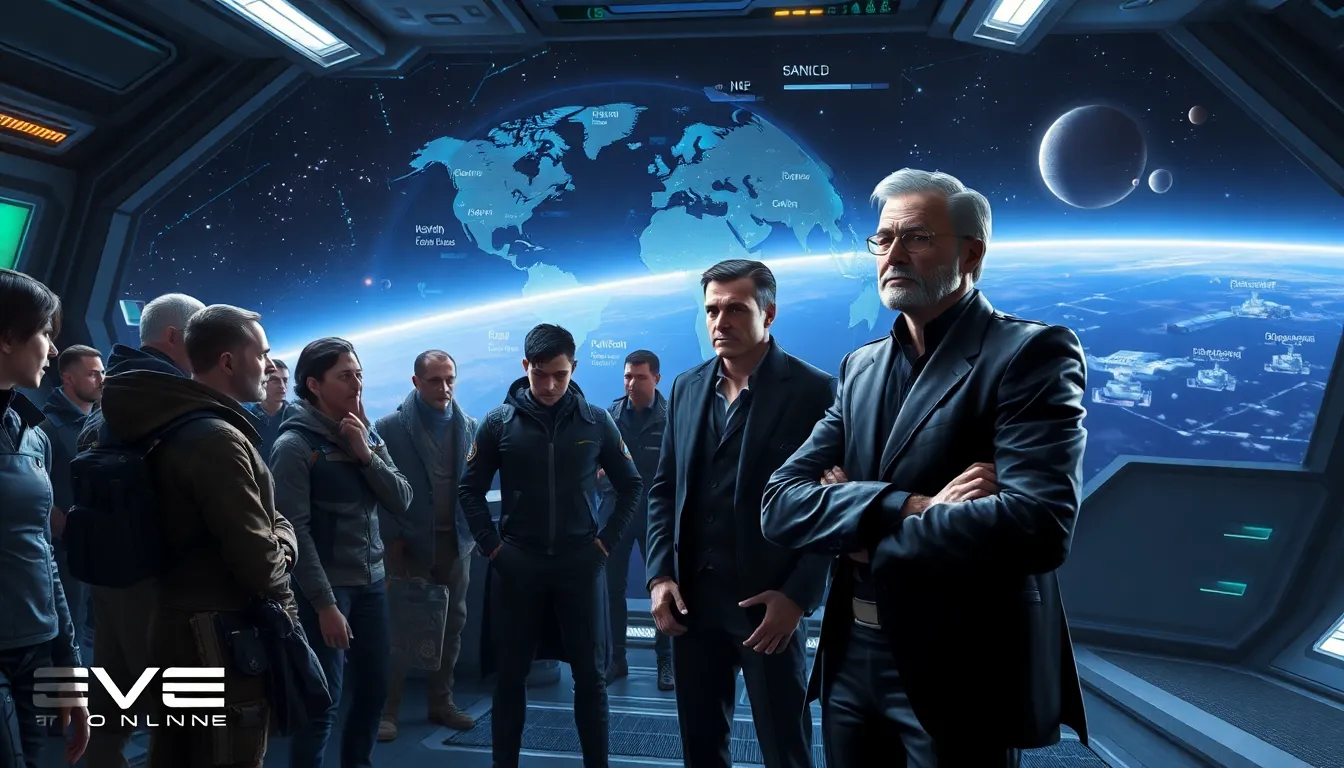Table of Contents
ToggleIn the vast universe of EVE Online, politics isn’t just a side quest; it’s the main event. Picture this: alliances form and crumble faster than a spaceship caught in a warp bubble. Players navigate a complex web of diplomacy, betrayal, and strategic maneuvering that makes even the most seasoned politicians look like amateurs.
Overview of EVE Online Politics
EVE Online politics serve as the backbone of the game’s intricate universe. Players actively engage in forming and dissolving alliances that directly influence their strategies and survival. Intrigue defines the political landscape, where diplomacy plays a critical role. Betrayals can emerge from trusted alliances, altering power dynamics within the game.
Participants often navigate a web of trusts and conflicts, reflecting true political scenarios. Groups of players, organized into alliances, pursue shared objectives that can include territorial expansion or resource control. Leaders often utilize trade agreements and diplomatic negotiations to solidify their influence across the galaxy.
The political landscape constantly evolves as new factions emerge and older ones disband. Players adept at reading the room leverage knowledge of rival groups to gain advantages. Information plays a pivotal role in shaping decisions, with espionage frequently employed to gather intel on rival strategies.
Conflict remains an inevitable part of EVE’s politics. Wars can be declared based on rival claims or strategic interests, resulting in large-scale battles that captivate participants. Players witness the fallout of political maneuvers, from loss of resources to shifts in territorial control, which can alter the course of the game.
EVE Online politics illustrate how complex interactions can mirror real-world situations. With every action taken, players contribute to an expanding narrative shaped by their collective choices and rivalries.
Key Factions in EVE Online

EVE Online’s political landscape is shaped by four key factions, each with unique attributes and motivations that drive player alliances and conflicts.
The Caldari State
The Caldari State prioritizes corporate interests and military strength. Governed by megacorporations, this faction emphasizes efficiency and capitalism. Players within the Caldari often work together to achieve collective revenue goals and territorial control. Alliance formation is common, with corporate entities uniting to enhance market influence. Betrayals among corporations can significantly impact power dynamics, as loyalty may wane in the pursuit of profit. Moreover, Caldari ships and technology reflect their emphasis on practical warfare and industrial capability.
The Gallente Federation
The Gallente Federation values democracy and individual freedoms. Known for their diverse culture, this faction attracts players who prioritize diplomacy and social influence. Utilizing their political system, Gallente often engage in extensive negotiations for alliances, balancing their ideals with practical military strategies. Their fleets emphasize agility and versatility, reflecting the federation’s innovative spirit. Conflicts frequently arise from their moral stance on issues, often challenging authoritarian regimes like the Amarr Empire. Players sometimes find themselves navigating a delicate balance between power and principle.
The Amarr Empire
The Amarr Empire represents a powerful, theocratic society focused on religious zealotry and order. Players often engage in intricate political maneuvers, driven by the desire to expand the empire’s influence. Alliances are typically formed around shared religious beliefs, bolstering their collective strength. Militarily, the Amarr boast heavily armored ships and formidable firepower. Conflicts often escalate due to their efforts to reclaim systems viewed as part of their divine mandate. This faction’s political machinations reveal an uncompromising commitment to hierarchy and control.
The Minmatar Republic
The Minmatar Republic champions freedom and resistance against oppression. Formed by former slaves seeking independence, this faction has a strong sense of justice and equality. Players in the Minmatar often unite to challenge the oppressive actions of the Amarr Empire. Engagement in guerrilla tactics and hit-and-run strategies highlights their adaptability in warfare. Ships designed for speed and maneuverability suit their style of combat. Political alliances often revolve around shared values, with unity against oppressive forces driving their actions. The Minmatar experience constant challenges, but their spirit of resistance remains an unyielding force in EVE Online’s universe.
Influence of Corporations and Alliances
Corporations and alliances significantly shape EVE Online’s political landscape. Player-driven entities influence strategies and alter power dynamics across the universe.
Major Alliances and Their Roles
Major alliances like Goonswarm Federation and Test Alliance Please Ignore navigate the complexities of EVE’s political environment. Goonswarm often advocates for aggressive expansion and resource acquisition, fostering collaboration among its members. Test Alliance focuses on maximizing player engagement and ensuring a vibrant community, striking balances between diplomacy and combat. Alliances regularly engage in warfare, responding to threats or pursuing opportunities for territorial control. Players in these alliances experience shared resources and strategic advantages against rival factions, highlighting the collective strength derived from organized group dynamics.
Corporate Influence on Politics
Corporate influence permeates the political scenarios within EVE Online. Corporations often pursue their objectives, aligning with larger alliances to enhance power and efficiency. Caldari corporations exemplify this by prioritizing profit and military strength. Their focus on trade agreements often leads to strategic partnerships that shape political alliances. Additionally, corporate espionage plays a critical role, enabling players to gather intelligence and manipulate rival factions. As players engage in negotiations, the interplay between corporate goals and political maneuvers creates a dynamic atmosphere that drives the narrative forward in EVE Online.
The Impact of Player Actions on Politics
Players’ actions deeply influence the political landscape in EVE Online, where wars erupt and alliances shift rapidly.
Wars and Conflict
Conflict forms an integral part of EVE politics. Wars often emerge from territorial disputes or strategic interests. Alliances declare wars to combat rivals, leading to large-scale engagements that attract thousands of participants. Each conflict generates a ripple effect, altering territorial control and resource allocation. Significant battles, like the Battle of B-R5RB, showcase how player decisions shape the universe’s political climate. Casualties here can shift entire alliances, demonstrating the volatile nature of these conflicts. Players engaged in warfare also enhance their characters, gaining skills and resources that impact future strategies. Consequently, navigating these political tensions becomes vital for survival and growth within the game.
Diplomacy and Negotiations
Diplomacy drives much of the strategic gameplay in EVE Online. Players prioritize negotiations and alliances as vital tools to secure objectives. Through trade agreements, alliances can enhance military power and resource access. Negotiation processes often involve complex discussions and compromises, reflecting real-world diplomacy. Notable examples include the formation of coalitions to confront shared adversaries or defend against aggressors. Players skilled in diplomacy can leverage trust and betrayal to outmaneuver opponents. Effective negotiators often shape the game’s political dynamics, leading to unexpected alliances and hostilities. As the environment evolves, the significance of diplomatic efforts remains crucial in determining players’ fates within the ever-changing landscape of EVE Online.
EVE Online Politics and Community Engagement
EVE Online politics significantly engage players, enhancing the overall experience. Community involvement drives governance and decision-making processes.
Player Voting and Governance
Player voting shapes governance structures within EVE Online. Examples include voting for leaders in alliances or corporations based on trust and capability. Votes often determine policies related to resource allocation and strategic objectives, reflecting the community’s influence. Decision-makers rely on player input to navigate intricate political landscapes, adapting to evolving alliances and rivalries. Those in positions of power must foster positive relationships with constituents to maintain authority. Engaging players in governance cultivates a sense of ownership and responsibility toward collective goals, promoting active participation.
Events and Their Political Implications
Events within EVE Online carry significant political weight. Major conflicts, like alliances forming or dissolving, shift power dynamics dramatically. Players experience heightened tensions during specific in-game events, often leading to unexpected alliances or betrayals. Such occurrences illustrate the fluid nature of political landscapes, echoing real-world scenarios. Community-organized events also bring players together, fostering cooperation against shared adversaries. By participating in these campaigns, players influence broader political narratives, contributing to the game’s ongoing storyline. Understanding event implications aids in strategizing future moves and maintaining an edge over rivals.
EVE Online’s political landscape is a vibrant tapestry woven from the actions and decisions of its players. The intricate web of alliances and betrayals not only shapes individual gameplay experiences but also creates a dynamic environment that mirrors real-world politics. Each faction brings its unique motivations and strategies, enriching the narrative and engaging players in a continuous cycle of conflict and cooperation.
As players navigate this complex universe, their choices resonate beyond mere gameplay. They contribute to a living story that evolves with every alliance forged or broken. In EVE Online, politics isn’t just a feature; it’s the essence of the game, driving players to adapt and strategize in an ever-changing cosmos.




